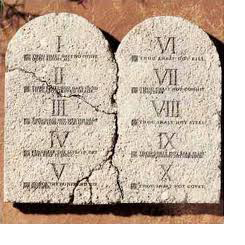The 10 Commandments of a Good Credit Score
June 3, 2012 | Posted by Blair Warner | 5 Comments A common question I get asked is, “what is the secret to a good credit score?” I always hate to answer it so matter-of-factly and quickly because I know they are hoping I can perform magic. The simple answer is, though, the only way to get one is to demonstrate financial responsibility. “Creditors don’t care about how many millions you may have in your investment account, it’s how you use your credit,” says Maxine Sweet, vice president, public education for Experian.
A common question I get asked is, “what is the secret to a good credit score?” I always hate to answer it so matter-of-factly and quickly because I know they are hoping I can perform magic. The simple answer is, though, the only way to get one is to demonstrate financial responsibility. “Creditors don’t care about how many millions you may have in your investment account, it’s how you use your credit,” says Maxine Sweet, vice president, public education for Experian.
However, there are some tips for using your credit, and like many things in life, it’s what you don’t do that can have a positive effect on your credit score.
Steer Clear of These 10 Things:
1. Thou Shalt Not Avoid Using Credit. If you don’t use credit, you won’t have much of a credit score. To Quote Sweet again, “A credit score is an important tool companies use to protect themselves”. The lower the score, the higher the risk, and this can affect whether or not a loan is approved.
2. Thou Shalt Not Miss Payments. Paying a bill late will hurt your credit, but missing a payment will damage it even more. “If you do so, you can’t make it up,” Sweet says. In other words, making two payments in the next billing cycle will not remove the blemish from your credit history. Whether or not you pay your bills on time determines 33% of your score.
3. Thou Shalt Not Limit Loan Types. Despite what your bank account may think, a car payment and a mortgage may not be enough. Also managing an installment debt, such as a credit card, is a good indicator of credit savviness. There are five elements to the credit score model and revolving credit, which allows consumers to charge and owe different amounts each month, is one of them. “It’s 10% of the score,” says Gail Cunningham, vice president of public relations for National Foundation for Credit Counseling.
4. Thou Shalt Not Close Unused Credit Card Accounts. Actually, just use caution, says Sweet. A factor in credit score models is your utilization, which is your debt vs. how much is available. For instance, if you owe $4,800 on a card with a $5,000 limit, you’re using most of your available credit and this “utilization” will have a negative impact on your score. Counting toward 30 percent, your utilization is the second highest factor in your credit score. You should charge no more than 30% of your available credit, recommends Cunningham.
5. Thou Shalt Not Be A Credit Tease. Don’t run up charges all over town or apply for several cards at once while looking for the best rewards program. Recent inquiries means that you have accessed your credit and this can affect your score negatively. “This signals that you’re desperate for credit and don’t have enough cash available for your purchases,” says Cunningham. She adds that if you are shopping for a major purchase, such as a mortgage or car loan, the inquiries will usually roll together into one.
6. Thou Shalt Not Rob Peter To Pay Paul. Don’t charge anything unless you know how and when you are going to pay it back. One of the benefits of credit is the ability to spread out payments on a big purchase, not to delay paying with hopes that the money will come in – from somewhere. If you need to use a credit card for convenience, use a prepaid card or a secured card that enables you to make payments to your own line of credit.
7. Thou Shalt Not Get On The Call List. When a debt turns into a collection account, it’s an indication that you got yourself in hot water. Once a collection agency jumps into the arena, it becomes the owner of the debt, which will show on your credit history. Trying to make payments to the original debtor will not make the collection agency or the negative mark on your credit go away.
8. Thou Shalt Not Forget The Little Things. That library fine you didn’t pay or the health club contract you signed but didn’t honor can show up on your credit report. Any debtor has the right to report unpaid bills to the credit bureaus, and many of them exercise that right.
9. Thou Shalt Not Negotiate. On paying less than what you owe, that is. If you cannot repay a debt in full and a creditor agrees to settle for less than you owe, you haven’t won the battle. The transaction will be reported as a settled account and this will hurt your credit score. Instead of negotiating to lower the overall amount of the debt, ask to have your interest rate or monthly payment lowered so that you can continue to pay the debt off in full. (Sometimes negotiating is the best choice. Each case is different)
10. Thou Shalt Not Give Up. If you have late payments, missed payments, defaulted loans, and similar credit mess-ups in-between, don’t give up and think that your credit history is ruined. Although offenses like these generally stay on your credit history for seven years, the recovery clock doesn’t start ticking until you have one full month of paying all of your debts on time, says Sweet.
Adapted from FreeCreditReport.com, a part of Experian. (excluding introductory paragraph)
Posted by Blair Warner
Tags: 10 Commandments, credit, credit score, FICOCategory : blog, credit, credit repair, FICO Score, Mortgage, Uncategorized











As usual, this was very informative. You really know your stuff Blair. Thanks so much!! I might need you soon…
Thanks, Judy. My pleasure. Call me anytime.
[…] 4. Thou Shalt Not Close Unused Credit Card Accounts. Actually, just use caution, says Sweet. A factor in credit score models is your utilization, which is your debt vs. how much is available. For instance, if you owe $4,800 on a card with a $5,000 limit, you’re using most of your available credit and this “utilization” will have a negative impact on your score. Counting toward 30 percent, your utilization is the second highest factor in your credit score. You should charge no more than 30% of your available credit, recommends Cunningham.Source: upgrademycredit.com […]
[…] to get you to read this posts. However, it’s true; when trying to get out of debt and improve your credit profile, it is often important to look at your finances and expenses and come up with ways to save money so […]
[…] Check your credit reports and scores As we have mentioned in our article The Ten Commandments of a Good Credit Score, it is crucial to know what is on your credit reports and monitor it regularly. If you are looking […]